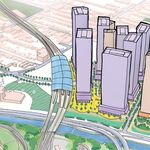lordmandeep,
The way people "push out" others in a neighbourhood, by definition, is when one group buys property in an area. If an area is rich*, how could poorer people afford to buy and displace richer people from a neighbourhood? They don't have any money to buy houses; let alone the money needed to buy houses in a wealthy area. Not having money relative to others is the definition of being poor.
What happened in the neighbourhood you're talking about was either a) that a richer person bought the house and is leasing it to poorer families who are tenants, or, b) 3 poor families pooled up their money, and bought the house together.
The case for a) is much more likely. In this case, the poorer families who moved there did not push out the rich, the rich person made the decision to buy the house and is profiting off of it. In many communities, there are regulations barring people - at least in theory - from buying houses and subdividing it into apartments, mostly to keep an area upscale.
I doubt it's case b). 3 families would have to trust each other with their money and enter a legally binding contract to own one house under one name. This is very risky. Even if this was the case, this is not an example of "the poor" pushing out the rich, because the rich people who were "displaced" have the means (money) to move to another, equally desirable part of town. This is a lateral move. Through gentrification, the poor (who don't usually own property but are tenants) must move to another area that is just as affordable, but is probably less desirable. It's a move down, in other words.
---
*(let's just use "rich" and "poor" in a relative sense to one another)




